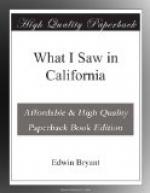The next morning (Feb. 6.), in hunting up our loose horses, we discovered the house about half a mile distant from our camp. Continuing our journey, we halted about nine o’clock at a rancho near the ruins of Santa Margarita. A solitary Indian was the only occupant of the house, and only inhabitant of the place; and he could furnish us with no food. Passing two or three other deserted ranches, we reached the house of a Mexican about one o’clock, where we obtained a meal of fried eggs and tortillas, after having been without food thirty hours. Late in the afternoon we arrived at the mission of San Miguel, now occupied by an Englishman named Reed, his mestiza wife, and one child, with two or three Indian vaqueros. Crossing the Salinas in the morning (Feb. 7), we continued down its eastern side, and encamped in a wide bottom under a large live oak. A quesadilla was all we had to eat. This was divided, one-half being reserved for breakfast. The fresh vegetation has so much changed the face of the country on this river since we passed along here in December, that I scarcely recognise it. The grass is six or eight inches high in the bottom, the blades standing so thick as to present a matted appearance, and the hills are brilliant with flowers—pink, purple, blue, and yellow.
On the 8th we continued down the eastern bank of the Salinas, passing through several large and fertile bottoms, and reaching the rancho of San Lorenzo about twelve o’clock. This rancho, as we learned from the proprietors, is owned by two bachelor brothers, one of whom told me that he had not been off his lands but once or twice for several years. Large herds of fat cattle and horses were grazing upon the luxuriant grasses of the plain, and there were several extensive inclosures sowed in wheat, which presented all the indications of an abundant harvest. But, with all these natural resources surrounding him the elder brother told us that he had nothing to eat in his house but fresh beef. A quantity of the choice pieces of a fat beef was roasted by an Indian boy, which we enjoyed with all the relish of hungry men. Our host, a gentleman of intelligence and politeness, made apology after apology for his rude style of living, a principal excuse being that he had no wife. He inquired, with apparent earnestness, if we could not send him two pretty accomplished and capable American women, whom they could marry; and then they would build a fine house, have bread, butter, cheese, and all the delicacies, luxuries, and elegancies of life in abundance. He appeared to be well pleased with the conquest of the country by the Americans, and desirous that they should not give it up. When we resumed our journey in the afternoon, he rode with us four or five miles to show us the way, and, on taking his leave, invited us to return again, when he said he hoped his accommodations would be much improved. Riding 15 miles, we halted at a tule-cabin, where we remained until two o’clock in the morning, when, the moon shining brightly, we mounted our horses, and continued our journey.




